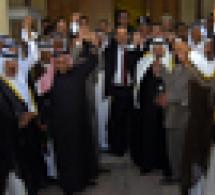 |
 |
Power Politics in Iraq
Iraqi elections are fast approaching. The results of these elections will have an immense impact on the political progress in the country. In the electoral battleground of the Shia-dominated south, Iraqi Prime Minister Nouri Al-Maliki has begun a campaign of tribal outreach in an attempt to consolidate his power at the national level. But Prime Minister Maliki is not alone in courting voters in the south. His recent moves are an important challenge to rival Shi'a parties, notably the Islamic Supreme Council of Iraq (ISCI).
ISW's latest backgrounder documents Prime Minister Maliki's tribal outreach in the summer and fall of 2008, and considers the implications for the Iraqi Shia political landscape. The backgrounder also presents ISCI's reaction to this outreach program, documenting statements and actions by party leaders and affiliates to counter Prime Minister Maliki's push for dominance.
